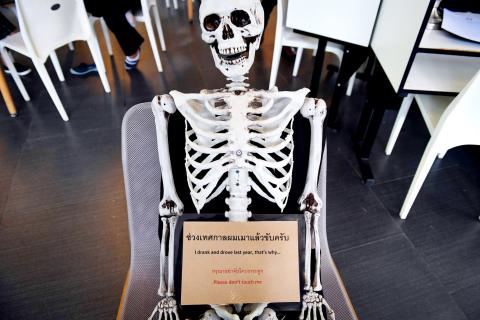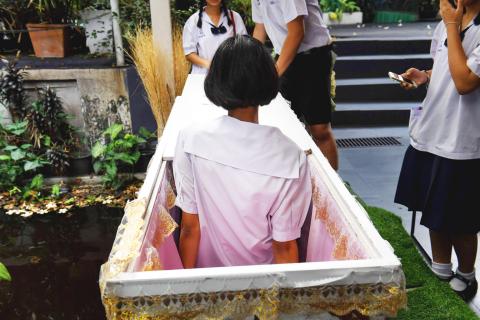Dying for a cup of coffee? You will feel right at home at Bangkok’s new “death awareness” cafe, a macabre, Buddhist spin on the themed-cafe craze where customers are urged to confront their own mortality — and live better lives as a result.
With drinks called “death” and “painful” on the menu and a skeleton splayed out on a couch in the corner, the meet-your-maker theme is alive and well at this open-air lunch spot in the Thai capital.
But the centerpiece of the “Kid Mai Death Awareness Cafe” experience is a decorated white coffin where customers are encouraged to lay down for a few minutes to contemplate their final moments — and secure a discount on a drink.

photo: AFP
“I feel like I am in a funeral,” 28-year-old Duanghatai Boonmoh said with a laugh as she sipped a chocolate “death smoothie” on a recent Saturday afternoon. She and other curious customers took turns climbing into the wooden box as friends sealed the lid.
“The first thing that came to my mind was, what if no one opens it?” Duanghatai said after emerging from the coffin. “How you going to tell everyone that ‘I’m here, I’m still alive?’ I think that’s probably the feeling you have when you know you’re going to die soon,” she added.
BUDDHIST CURE

photo: AFP
The cafe’s owner says his restaurant is more than just a gimmick or dark take on the cute and cuddly coffee shops common in the Thai capital, which boasts everything from cat, husky and meerkat cafes to unicorn and mermaid-themed eateries.
A professor and social researcher, Veeranut Rojanaprapa conceived of the cafe as a way to teach Thai people — some 90 percent of whom identify as Buddhist — about the benefits of “death awareness.”
“We found that having an awareness of death decreases greed and anger,” explained Veeranut, whose giggly demeanor belies his fascination with more morbid matters.
He believes the Buddhist concept, rooted in ideas of impermanence and selflessness, is the key to ridding Thai society of chronic problems like violence and corruption.
“When one is aware of their own death, they will do good. This is what our Lord Buddha teaches,” he explained.
The casket experience is also a way to nudge the country’s technology-addicted youth to step back and reassess their personal lives.
“When teenagers go down to the coffin and our staff close the coffin, because of the darkness, because of the small space, they will be aware of themselves... they will recall the things that they still haven’t done,” said Veeranut, adding that he makes a point of considering his own demise nightly.
The professor is not the first to offer a resurrection experience in Thailand, where a temple outside Bangkok is famous for hosting symbolic funerals for devotees looking to clear their souls of bad karma. But his cafe and coffin sit squarely in the middle of a local community center in northern Bangkok, offering a public — and morbid — reminder of mortality that not everybody in the neighborhood is happy about. The cafe has also spread out to a public walkway, which is now posted with signs asking questions like: “What is the purpose of your life?”
“This is so disturbing. I feel really strange walking there and might avoid this shortcut,” one Netizen wrote on a neighborhood Facebook page.
Yet Veeranut says he welcomes any controversy as a sign of success.
“I love all of the complaints. Because if they are complaining it means they are thinking about death, they are aware of death.”

June 2 to June 8 Taiwan’s woodcutters believe that if they see even one speck of red in their cooked rice, no matter how small, an accident is going to happen. Peng Chin-tian (彭錦田) swears that this has proven to be true at every stop during his decades-long career in the logging industry. Along with mining, timber harvesting was once considered the most dangerous profession in Taiwan. Not only were mishaps common during all stages of processing, it was difficult to transport the injured to get medical treatment. Many died during the arduous journey. Peng recounts some of his accidents in

“Why does Taiwan identity decline?”a group of researchers lead by University of Nevada political scientist Austin Wang (王宏恩) asked in a recent paper. After all, it is not difficult to explain the rise in Taiwanese identity after the early 1990s. But no model predicted its decline during the 2016-2018 period, they say. After testing various alternative explanations, Wang et al argue that the fall-off in Taiwanese identity during that period is related to voter hedging based on the performance of the Democratic Progressive Party (DPP). Since the DPP is perceived as the guardian of Taiwan identity, when it performs well,

The Taiwan People’s Party (TPP) on May 18 held a rally in Taichung to mark the anniversary of President William Lai’s (賴清德) inauguration on May 20. The title of the rally could be loosely translated to “May 18 recall fraudulent goods” (518退貨ㄌㄨㄚˋ!). Unlike in English, where the terms are the same, “recall” (退貨) in this context refers to product recalls due to damaged, defective or fraudulent merchandise, not the political recalls (罷免) currently dominating the headlines. I attended the rally to determine if the impression was correct that the TPP under party Chairman Huang Kuo-Chang (黃國昌) had little of a

A short walk beneath the dense Amazon canopy, the forest abruptly opens up. Fallen logs are rotting, the trees grow sparser and the temperature rises in places sunlight hits the ground. This is what 24 years of severe drought looks like in the world’s largest rainforest. But this patch of degraded forest, about the size of a soccer field, is a scientific experiment. Launched in 2000 by Brazilian and British scientists, Esecaflor — short for “Forest Drought Study Project” in Portuguese — set out to simulate a future in which the changing climate could deplete the Amazon of rainfall. It is